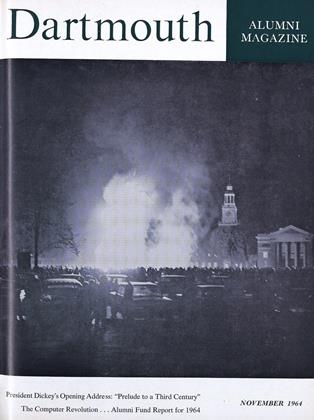By Professor Emeritus RamonGuthrie and Professor George E. Diller.New York: Charles Scribner's Sons, 1964.491 pp. $6.95.
In 1942, French Literature and ThoughtSince the Revolution first appeared; it is a landmark in the friendship and collaboration of Ramon Guthrie and George Diller which has had enduring success. Last year the Ramon Guthrie Kaleidoscope was published, under the inspired editorship of Professor Diller. The enthusiastic response of Ramon Guthrie's friends to this tribute at the time of his retirement was echoed by the American Institute of Graphic Arts award. Now there appears another beautiful and useful book, which is in some ways the most apt testimonial to their long and fruitful career together at Dartmouth.
To say that Prose and Poetry of ModemFrance is a sequel to the earlier anthology is less than the truth, unless the term is understood multivalently. Although part one, "The Precursors," overlaps somewhat with its predecessor, in both chronology and choice of texts, it may be said that the book is a continuation of the authors' survey of literary history (the rich new notes on Rimbaud's "Bateau ivre" would alone be sufficient justification for overlap, even if the presence of these six 19th Century authors weren't necessary for understanding of their influence). But the sequence between the two anthologies is more than historical: it is to be found in the development of the critical apparatus of the later book, in its increased concentration on purely literary texts and, especially, in its inclusion of more generous portions of the authors represented (including the entire texts of Gide's Retour de l'enfant prodigue, Sartre's Huis clos and Camus' La Femme adultère). Where extracts are given, they are copious and unified. While every teacher or amateur of contemporary French writing would inevitably have additions to suggest, what the editors have elected to include is all choice and eminently readable literature. Their excellent introductory material is supplemented by a compact and useful bibliography for each author included.
The book is divided into four major groupings: the "Precursors," as noted before (Baudelaire, Mallarmé, Rimbaud, Tristan Corbière, Lautréamont, Jules Laforgue); "Master Builders" (Bergson, Barrès, Péguy, Claudel, Proust, Valéry, Gide); "Cubism and the New Spirit" (Alfred Jarry, Apollinaire, Giraudoux, Supervielle, Mauriac, Cocteau, André Breton, Eluard, Aragon, Malraux); and "Midstream" (Sartre, Camus, Henri Michaux, Prévert, Rene Char, SaintJohn Perse). It may be seen that the divisions are not strictly chronological; it is fitting that the.book should come to an "open end" with the timeless and universal epic of Saint-John Perse, whose hallucinatory verse is illuminated by the editors' notes.
This is an outstanding anthology, and one that, like its predecessor, should remain modern and useful for years to come.
Assistant Professor of French
 View Full Issue
View Full Issue
More From This Issue
-
 Feature
FeaturePrelude to a Third Century
November 1964 -
 Feature
FeatureTHE COMPUTER REVOLUTION
November 1964 By GEORGE O'CONNELL -
 Feature
FeatureThe Darthmouth Alumni Fund REPORT 1963-1964 1915 Golden Anniversary 1964
November 1964 -
 Feature
FeatureREPORT CARD
November 1964 -
 Feature
FeatureOnward and Upward with '68
November 1964 -
 Article
ArticleTHE UNDERGRADUATE CHAIR
November 1964 By BOB WILDAU '65
DAVID SICES '54
Books
-
 Books
Books"Dartmouth's New Library"
APRIL 1929 -
 Books
BooksALP.
MAY 1970 By JOHN J. KANE -
 Books
BooksMILL TOWN.
November 1954 By MALCOLM KEIR -
 Books
BooksSOCIAL ORGANIZATION
January, 1931 By Rees H. Bowen -
 Books
BooksA SECOND COURSE IN COMPLEX ANALYSIS.
FEBRUARY 1968 By REESE T. PROSSER -
 Books
BooksIdealism in the Trenches
NOV. 1977 By ROBERT A. PICKEN '56




